This land belongs to the meadow, or: Eulogy for the living utopia of Lützerath
Posted by anarcholatina on 2023-01-16
For some two-and-a-half years, activists occupied the old German village of Lützerath to prevent the expansion of a brown coal mine, Garzweiller II, owned by the RWE megacorp. Nature defenders made of Lützerath a prefigurative space, a living example of what a better world could be, until the brutal eviction of 2023. I’m writing as their machines still finish their job of destruction, because I want to talk of Lützerath: his life, his people, his politics.
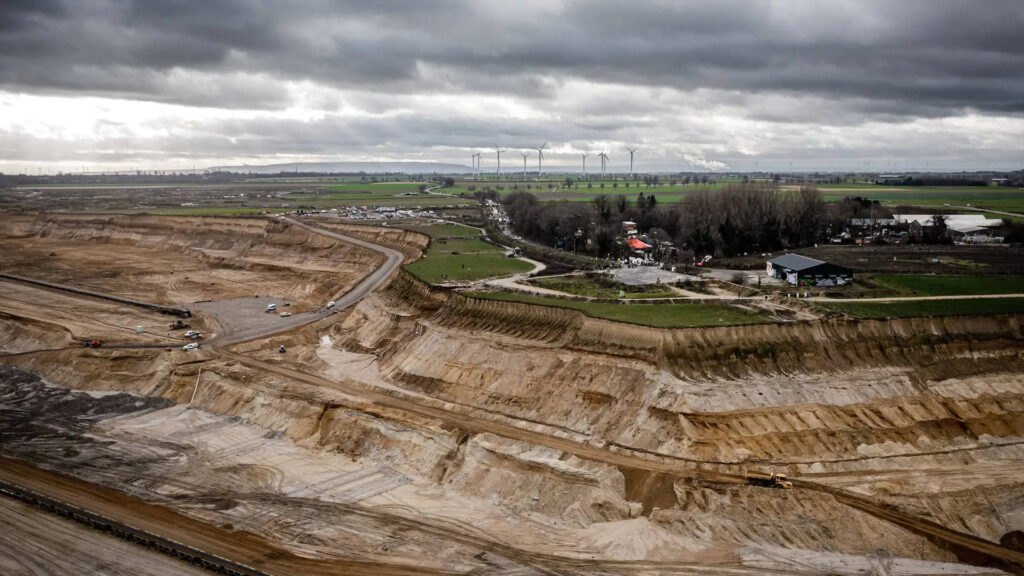
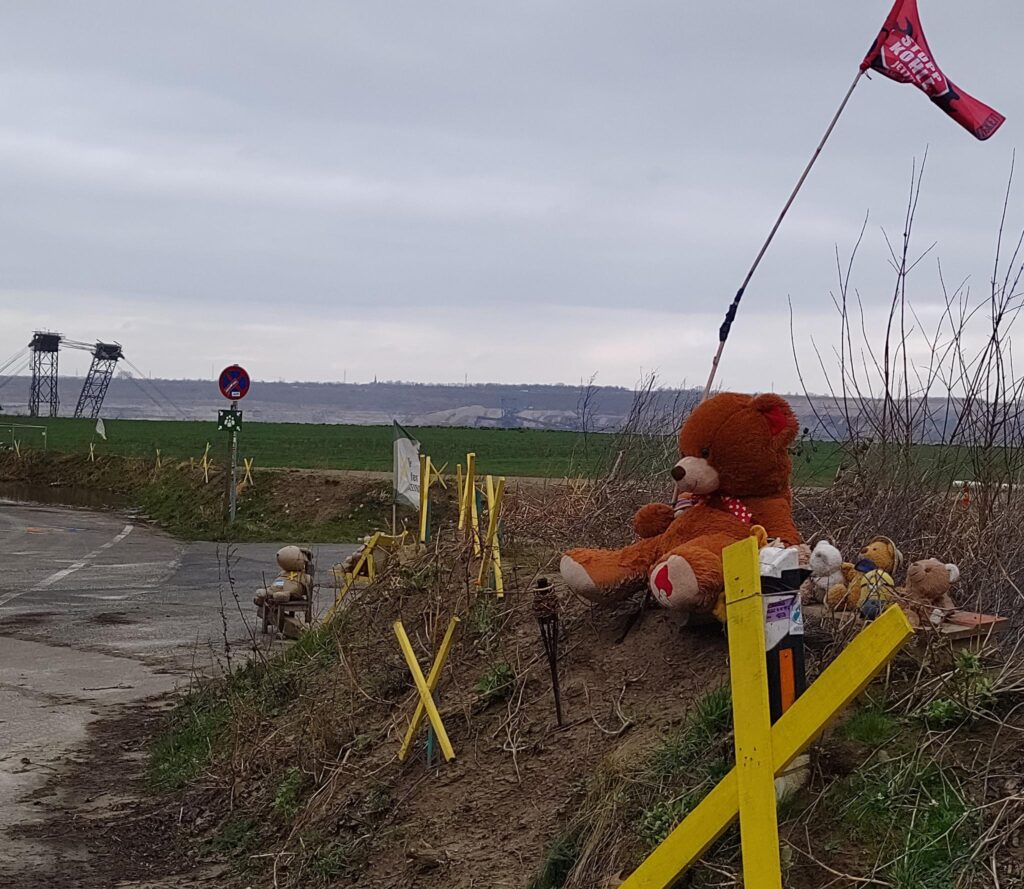
1. Life
It is physically painful for me to watch the baggers—those giant skeleton ships from hell, made of steel and death—literally eating away the Earth, chunk by chunk, when I know of the rich diversity of insect life who thrives on the wildflower patch activists maintain; when I spot the holes for bird nests in the clay; when comrade hare darts in the floodlights between our barricades and the cops, jumping back and forth for reasons of her own; when the trees who so loved us are fallen, one by one, sending the larks flying into the night.
I look at reddit and the top voted comment says that people are too emotional about Lützerath and we should look at facts and logic and that the coal is necessary in case of emergencies and that the ‘empty’ village is purely symbolic and that the activists shouldn’t hurt themselves or others because the land is, and I quote, not worth it.
I would gladly saw off my own arm to stop this senseless murder. Alas, the option is not given.
We once found a crashed crow in Lützerath. I thought he was dead, but upon covering him with a soft blanket, his head moved very slowly. We ran across the camping fields to ask help from the other squatters; a bunch of masked antifa girls told us that they’d call for specialists but first let him drink water, a lot of birds are collapsing out of heat exhaustion. By the time we made it back to our shack, someone had put birdseed and water next to the blanket, and the crow had flown away.
Earthworms are down in the UK 33% this year. I feel like people are underestimating what this means, what the soil life means for plants and, consequently, us. The ocean has never been that hot, reaching another record on the week of the eviction. Lützi has enough coal under it to blow over Germany’s 1,5°C commitment six times over, and it is “purely symbolic”.
The first time I ever stepped in Lützerath, the first thing I saw was ladybugs mating on the leaf of lavender. I wrote on a barrier:
This land belongs to meadowbees
wildflowers trees
the crow
nameless little bugs birds
butterflies
For all the good that my writing did. I watched my friends murdered before my eyes. I cried, again and again facing the police, and not due to the torture holds.
I haven’t seen a single mainstream media talk of non-human lives in Lützerath. The hare doesn’t get a vote on coal mining, the earthworms are not accounted for in the spreadsheets. You killed my friends and I will never forget this.

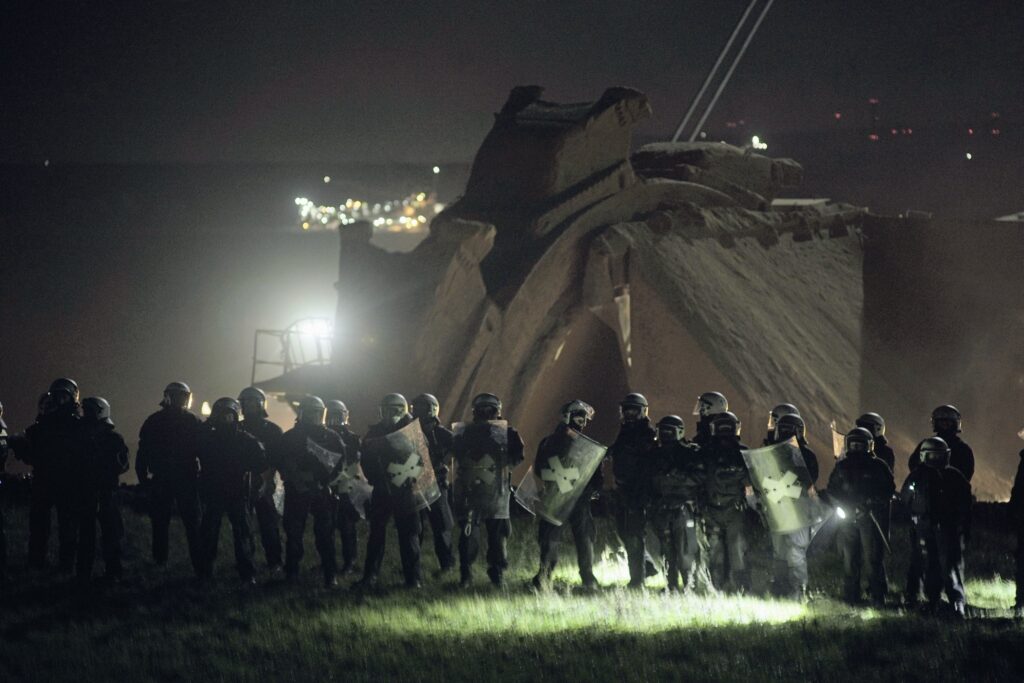
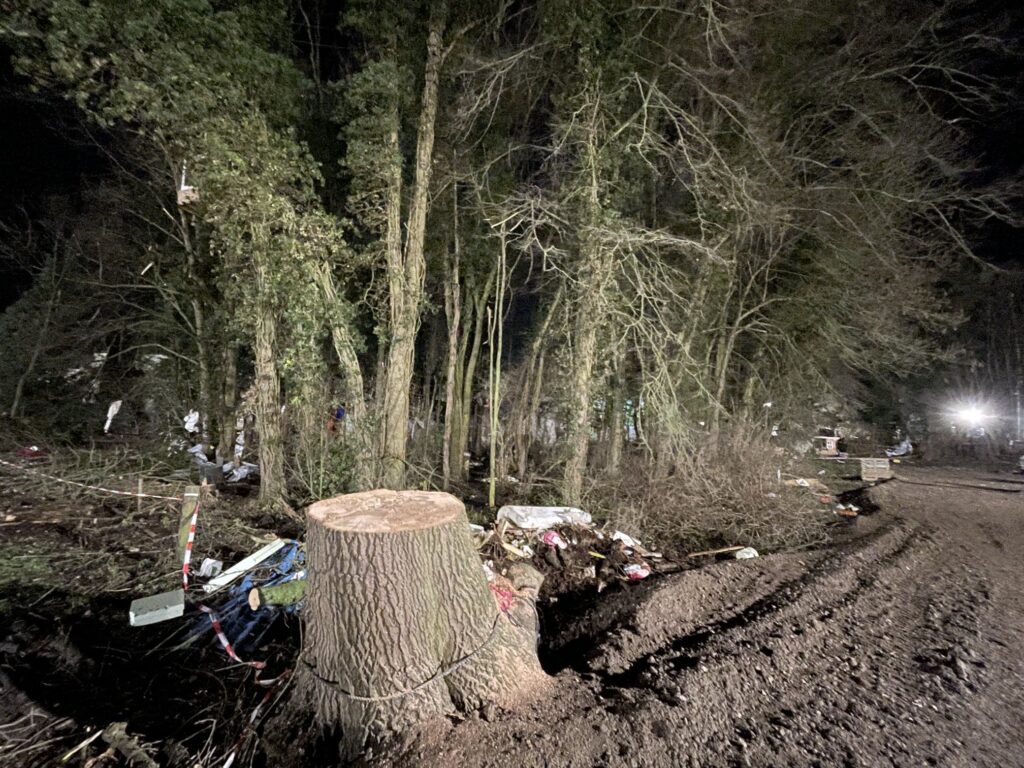
2. People
I became an anarchist from books, from studying politics and history and realising that only in an anarchist society would a weird queer like me be safe and allowed to thrive. I was already convinced of this, by the historical example of, well, literally any government ever, including the so-called ‘communist’ ones (especially those ones). But Lützerath brought the fire of anarchy to life, seared the experience into my flesh & bones.
Everyone who lived in Lützi, however briefly, will talk to you about it with a spark in their eyes, struggle for words, ‘you had to be there’, ‘it was something special’. A few hundred people and we built a working collective kitchen churning out 3 delicious meals a day; a pirate radio; 24/7 vigils before the baggers; a restoration for a mysterious ancient shrine in the woods, maintained daily; periodic large-scale events and festivals and protests, bringing ecological defenders from Mexico, from Africa, South America; fields of vegetables and healing herbs; a vigil of plushies; the fucking heroic Shit Brigade maintaining the best separation toilets I’ve ever had the pleasure to use; an anti-racist library; permanent workshops of all sorts of practical skills—many people have described life in Lützi as something like what a university should be, we learned so much in so little time; awareness groups and safe spaces for neurodiverse people, BIPoC, queer, women, accommodations for wheelchair occupiers; a skilled medic team; a savvy media team; an antifa skateboarding training hall which is probably the raddest thing I’ve ever seen; collective housing of all sorts, from camping hills to tree houses to wooden cabins to large, abandoned industrial buildings turned into beautiful queerfeminist spaces, filled with life and art and joy——
All for free. Everything for everyone.
At any moment in time you (whoever ‘you’ might be) could join in by simply walking into the woods. No rent, no fees. Stop by the watch for (free) hot coffee, walk by the trees towards the infopoint; there’s a board with the days’ activities, always full. 18:00 is the on-boarding. You have time to kill so you wander by, there’s a small kitchen with (free) bread and (free) vegan spreads, you help yourself. As you eat you meet three activists from Spain, they’re staying long-term, you discuss political projects and somehow it seems that here it matters, that something is happening. Someone comes running from the road, shouts: ‘mic check!’ Everyone within hearing distance echoes in full voice: ‘mic check!’ ‘The collective kitchen needs’, the messenger continues, and everyone repeats, amplifying their voice: ‘The collective kitchen needs’, ‘3 people’, ‘3 people’, ‘to help carry boxes’, ‘to help carry boxes’. You find yourself going there.
No one ever tells you what to do, no one tries to coerce, manipulate or guilt-trip you into being a productive worker, no one conditions your shelter or sustenance on labour, everybody talks things over together in assemblies, and together we build a good place to live in, a life worth living. Lützerath was a pearl of the German autonomist tradition.
And then you walk across the dirt road and it’s the baggers and the coal mine, a literal crater on Earth, a wound extending as far as you can see, giant machines digging away towards you and your friends. Lützerath wasn’t purely symbolic, but it was one hell of a symbol. What a contrast. What a world that we could have and a world they impose onto us. If this was a movie it’d be called melodramatic, unrealistic. In Lützerath you could watch the global ecocide in a metonimic diorama of itself. I would often go to Skywalk, the observation platform, and watch the baggers. Just stay there, watching the destruction. I felt like someone should bear witness to death if nothing else. Others felt like me. I was never lonely in Lützerath.
I cry for Lützerath, not just because of my dead friends from the Earth, not just because of the sadness of my human friends, not just because this coal will kill many more, but because I selfishly wanted to live there forever because that place was the closest I ever got to experience community, which in the 21st century felt like utopia, and now I’m thrown back into capitalism and nothing you can do in capitalism will buy me that.
Everyone who’s ever been in Lützi and made it what it is, thank you. When you watch the scenes of the cops putting down our buildings, when you watch their glee, their mockery when they seize and make use of our spaces and structures, keep this in mind: The reason they hate you is that you have proved cops to be unnecessary. For two beautiful years we lived with no rulers and no enforcers, no elected representatives and no ‘community leaders’, and we lived better without them than we ever did under them. You have found the one weird secret that parties and authorities don’t want you to know; you have tasted the secret of freedom, and the taste lingers in your mouth.
I will quote what a zapatista insurrectionary told us in the forest once:
‘The enemy would all the time invade with their helicopters and tanks and they would blow up our schools, our houses, our headquarters, and the media would say, Zapatistas defeated! The Zapatista rebellion is over!’ —and I want you to imagine him saying this and meaning every word, standing in the dark woods, voice trembling with emotion: ‘But every time we would go back into the pueblos and hide with the people and then we would come back again, because la rebelión is not in the buildings. La rebelión is in our hearts.’
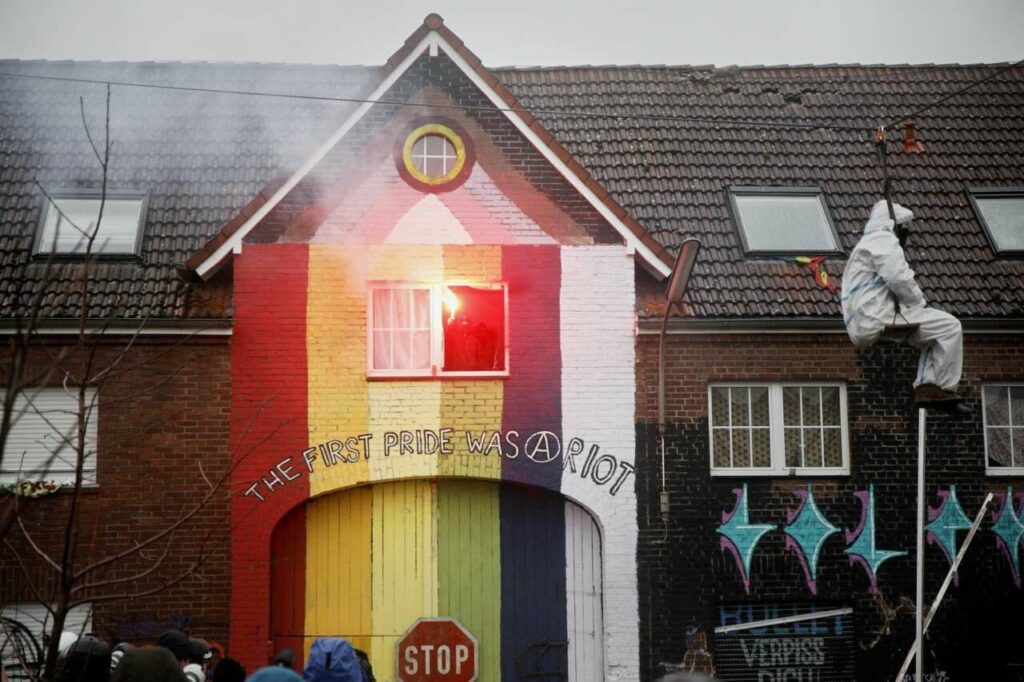
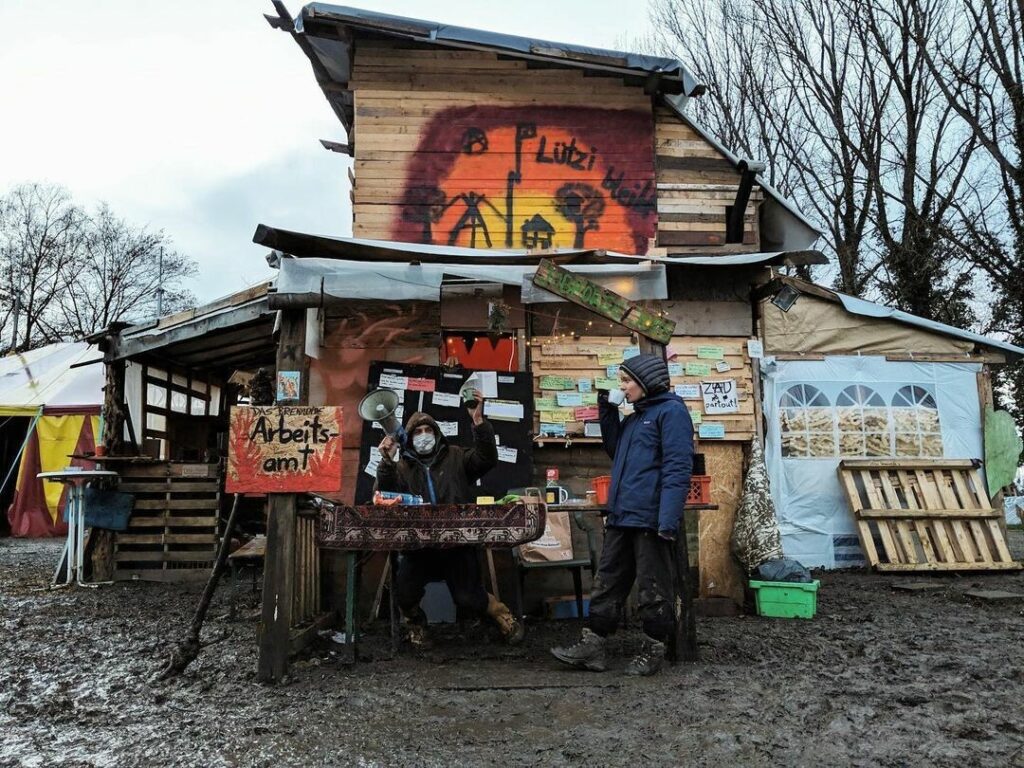
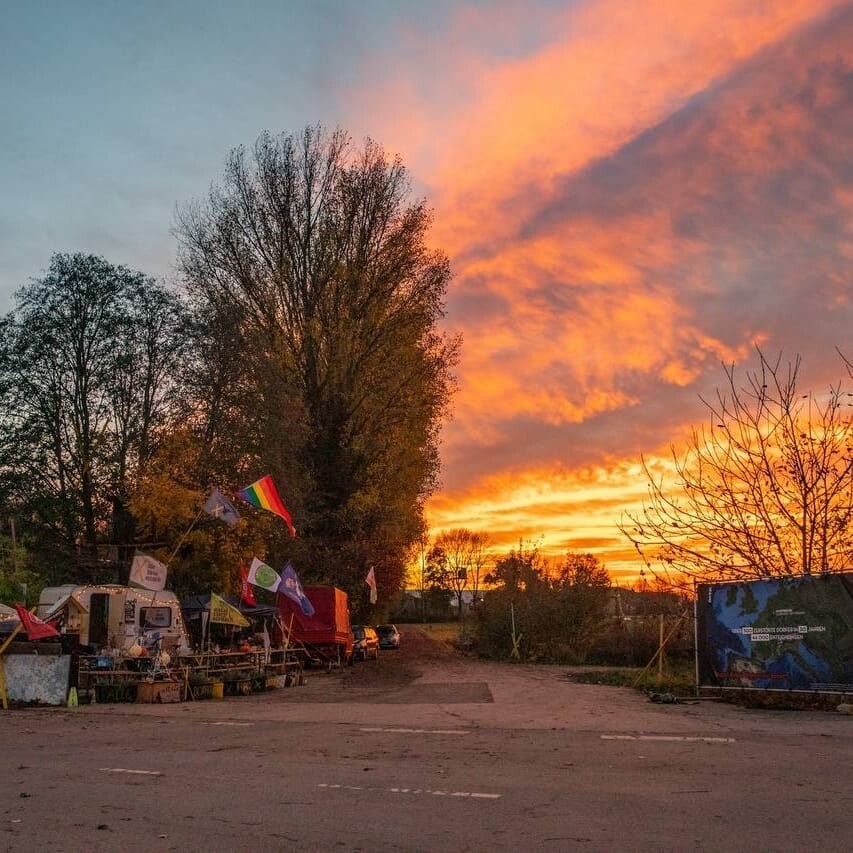
3. Politics
Lützerath represents for me the complete failure of the politics of activism.
Two years of the most organised campaign I’ve ever seen. Large-scale demonstrations were routine, we had 35 thousand in the counter-eviction demo, Greta Thunberg came along. International media, statements of support from every continent. Scientist Rebellion on our side, a petition by 700 specialists on how this coal is neither desirable nor necessary, detailed studies on the topic all agreeing. All the diversity of tactics you can imagine, lock-ins and glue-ons, people in tripods and monopods staying awake day and night with police lights blasting on their face, people hiding in tunnels, arm-by-arm-blockades, an ex-cop quoting to cops on how to be a conscientious objector, elderly people, wheelchair users trying to reason, sabotage of pumps, barricades deep into the earth and covering every road. Greenpeace, Last Generation, Ende Gelände, Fridays for Future, XR, anarchists, communists, antifas, random libs, old hippies, pacifists, militants, Hambi veterans, preteens concerned about the future and retired couples concerned about their grandkids. Frankly masterful design work, large outdoor signs detailing the ecological situation with maps and infographs and citations, an iconic, memorable and self-explanatory visual language (that yellow X barrier can be made into an outfit in 10 seconds with adhesive tape), propaganda movies with high production values, with humour and empathy and vibrant with energy. The Christians restored the mysterious forest shrine, maintained it daily, brought up a cross styled in the yellow X of the movement (blessed by the Pope, carried in pilgrimage), an elderly Christian lady slept outdoors at the shrine on the day of the eviction (sub-zero temperatures, winter rain, windstorm). A cause that enjoys more popular support than anarchism or socialism. A particularly egregious example of that cause—there is no reason to burn this brown coal, none, nothing, it isn’t even profitable anymore, it’s the worst type of lignite that will cost millions and take a long time to even purify into something usable, at a huge pollution collateral, with investments that would generate more money on fucking wind power, let alone the mass death it causes, a senseless destruction of villages dating from the 1100s along with the biosphere of the entire planet for no other reason than sunken costs of a few shareholders, very obviously nothing more than that. A legalist argument was dug up—turns out the company doesn’t even own all the land yet, they have failed to coerce some farmers into selling even now, the digging is technically illegal. Highly motivated activists ready for anything, my mates chained arms with me, spitting at the surrender offers from the cops, making improv privacy walls with safety blankets to piss in buckets, dragged one by one with torture holds and blows to the head and chokes and pepper spray, everyone chanting revolutionary songs softly. And the Green Party in power, elected enthusiastically by voters who did it specifically to stop the burning of coal.
All that, and the cops sent by the Green Party government steamrolled right through us, breaking bones as casually as the baggers break the soil food web. To protect the profits. Of a private company. By digging the land to mine brown coal.
There is a particular kind of gaslighting nausea when your joints are still aching from what the cops did to you, and you read social media comments praising the cops for their professional behaviour and restraint. The destruction of Lützerath is as blatantly evil as evil gets, and it nonetheless got polarised instantly, like everything does these days. Lützi people being randomly bashed in the head by cops have shown downright heroic commitment to passive resistance, yet we were being called violent rioter extremists who should be gassed and executed due to our… burning barricades.
Do not make the mistake of believing that if you play by the rules you won’t be oppressed, criminalised, or beaten. They will change the rules to get you if they have to. The people who will hate you if you break the rules, already hate you no matter what you do. And the enforcers of the rules don’t have to play by the rules.
Many people tried to reason with the cops. We’re doing this for your children! Your mother is ashamed of you! You can stop, you know there’s a system to reject participation in operations you deem unethical? I’m a 65-year-old teacher, I had to take vacations from school to be here, look at which side you’re on!
The cops could not be reasoned with.
The cops took selfies relaxing in our structures, posing with everything they stole from us or smashed to pieces, pointedly lampshading their glee. “Don’t you have a family?”, someone shouted while being dragged away, and exceptionally, a cop actually answered, right after shoving her to the ground:
“No.”
I usually stand at the frontline, and at one point I tried looking a riot cop straight into the eye. It was impossible. His eyes flickered constantly, moving into all directions, trying to take it all in, one hand on his gun another hand on his big stick. He wore in his face panic, or fury, or both. All he saw was enemies, a whole horizon swarming with enemies, all he waited for was a pretext.
We got messages of support from our comrades in Chiapas, in Rojava, in Ukraine, in the Amazon. But I cannot help but feel like we’re playing games here. In Chiapas, in Rojava, in Ukraine, in the Amazon people are defending territory against the enemy. Here we deliberately put our bodies in vulnerable positions before our enemies, hoping that, hoping that what? someone, somewhere does something? The government takes a stand against the obscenely wealthy company who owns the whole lobbyst sector? The Board of Directors is moved by the scenes of bravery and, touched deep in their hearts, calls off the baggers?
We lie down before our bullies like toddlers in a tantrum, point fingers, call out: This is bad! They’re breaking everything! They’re hurting us! But we’re long past the point where calling out will do anything.
I don’t know how to organise active resistance here in the EU, in the heart of the beast, to protect the patches of nature that are left. I don’t know what shape of resistance would be tactical here. But to those who think that the armies of rich countries are unbeatable, I will remind that the Taliban defeated the U.S. army and are we really less committed to justice than the Taliban is to patriarchy? I do not know what shape of resistance would be tactical here, but I know it will involve things like in Chiapas, like in Rojava, like in Ukraine, like in the Amazon. To quote the Institute For The Study of Insurgent Warfare:
An activist’s enemies then are the particular set of abstract bad things they endeavour to set aright and their opponents are fellows who merely happen to be on the wrong side of the issue. By comparison, an insurgent’s enemies are never abstract, but rather discrete entities of flesh, stone, or steel, from bodies to buildings, which at a specific time and place obstruct their interests.
Which is to say, the people who are doing this to the land and to us are physical people of flesh and blood, who have names and addresses.
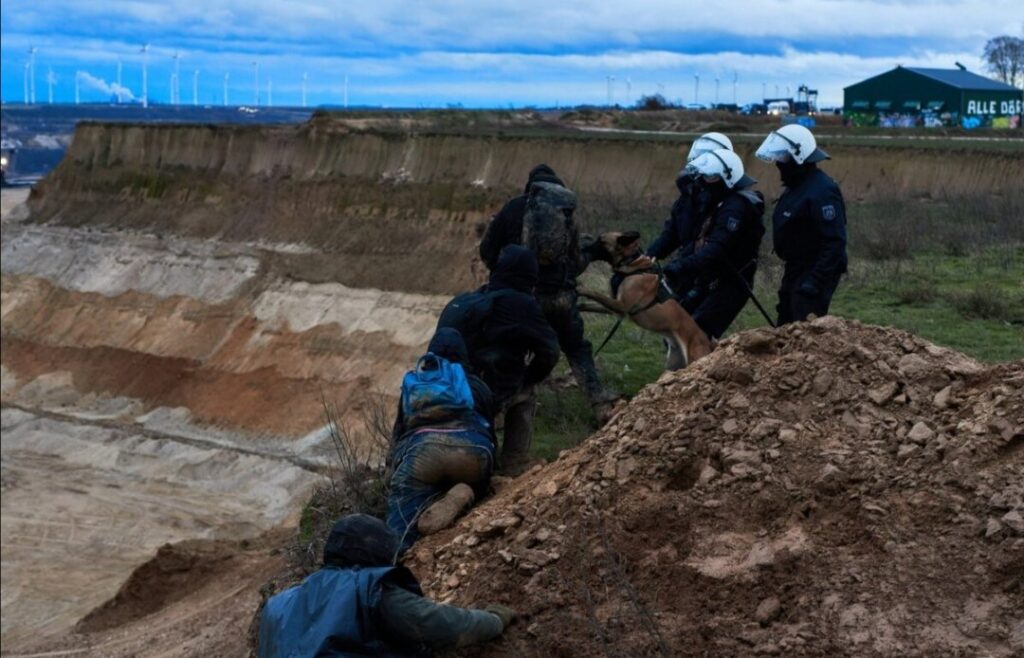
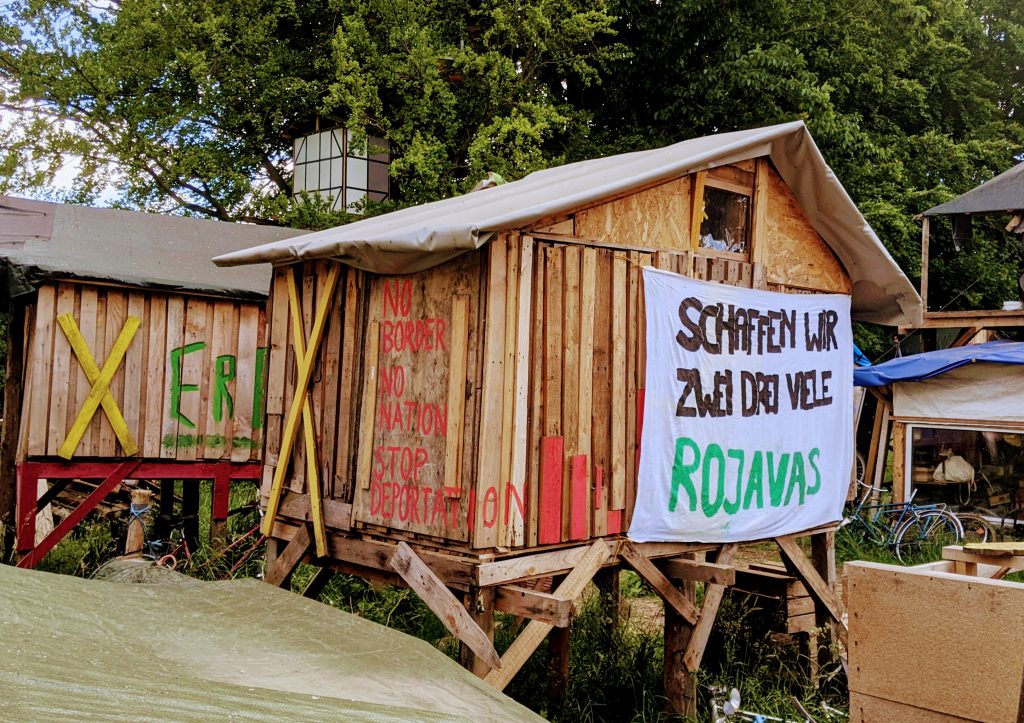
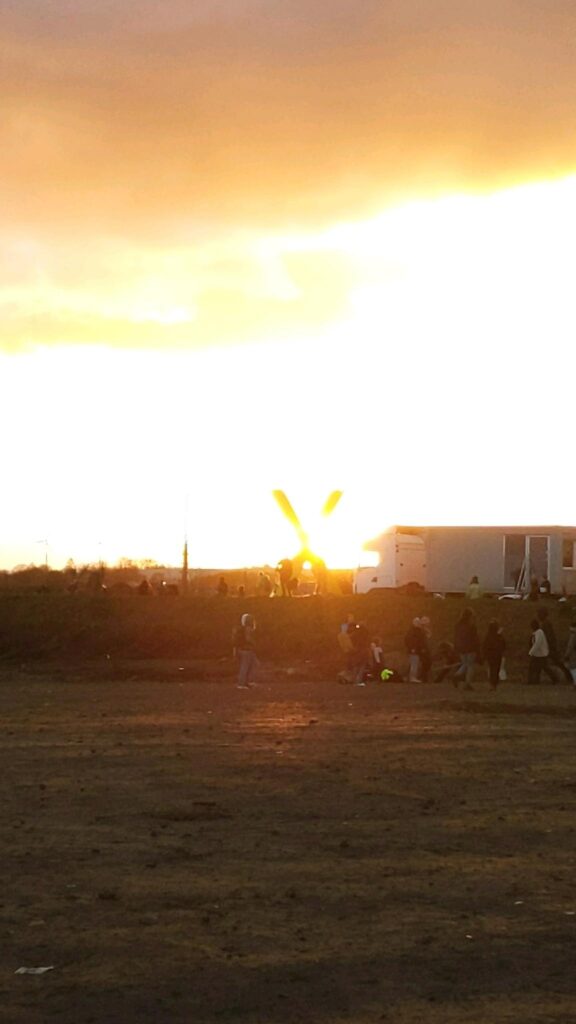
Filed under life in the planet
Bretch (1935), “Questions of a Worker who Reads Wikipedia”
Eine Frau Ist Meu Pau: A speech upon a terf talk on the wake of the Colorado shootings